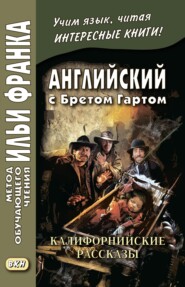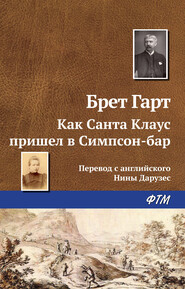По всем вопросам обращайтесь на: info@litportal.ru
(©) 2003-2024.
✖
Gabriel Conroy
Автор
Год написания книги
2017
Настройки чтения
Размер шрифта
Высота строк
Поля
What was that noise? The house had been very quiet, so still that she had heard a woodpecker tapping on its roof. But now she heard distinctly the slow, heavy tread of a man in one of the upper chambers, which had been used as a lumber-room. Mrs. Conroy had none of the nervous apprehension of her sex in regard to probable ghosts or burglars – she had too much of a man's practical pre-occupation for that, yet she listened curiously. It came again. There was no mistaking it now. It was the tread of the man with whom her thoughts had been busy – her husband.
What was he doing here? In the few months of their married life he had never been home before at this hour. The lumber-room contained among other things the disjecta membra of his old mining life and experience. He may have wanted something. There was an old bag which she remembered he said contained some of his mother's dresses. Yet it was so odd that he should go there now. Any other time but this. A terrible superstitious dread – a dread that any other time she would have laughed to scorn, began to creep over her. Hark! he was moving. She stopped breathing.
The tread recommenced. It passed into the upper hall, and came slowly down the stairs, each step recording itself in her heart-beats. It reached the lower hall and seemed to hesitate; then it came slowly along toward her door, and again hesitated.
Another moment of suspense, and she felt she would have screamed. And then the door slowly opened, and Gabriel stood before her.
In one swift, intuitive, hopeless look she read her fate. He knew all! And yet his eyes, except that they bore less of the usual perplexity and embarrassment with which they had habitually met hers, though grave and sad, had neither indignation nor anger. He had changed his clothes to a rough miner's blouse and trousers, and carried in one hand a miner's pack, and in the other a pick and shovel. He laid them down slowly and deliberately, and seeing her eyes fixed upon them with a nervous intensity, began apologetically —
"They contains, ma'am, on'y a blanket and a few duds ez I allus used to carry with me. I'll open it ef you say so. But you know me, ma'am, well enough to allow that I'd take nothin' outer this yer house ez I didn't bring inter it."
"You are going away," she said, in a voice that was not audible to herself, but seemed to vaguely echo in her mental consciousness.
"I be. Ef ye don't know why, ma'am, I reckon ez you'll hear it from the same vyce ez I did. It's on'y the squar thing to say afore I go, ez it ain't my fault nor hiz'n. I was on the hill this mornin' in the ole cabin."
It seemed as if he had told her this before, so old and self-evident the fact appeared.
"I was sayin' I woz on the hill, when I heerd vyces, and lookin' out I seed you with a stranger. From wot ye know o' me and my ways, ma'am, it ain't like me to listen to thet wot ain't allowed for me to hear. And ye might hev stood thar ontel now ef I hadn't seed a chap dodgin' round behind the trees, spyin' and list'nin'. When I seed thet man I knowed him to be a pore Mexican, whose legs I'd tended yer in the Gulch mor'n a year ago. I went up to him, and when he seed me he'd hev run. But I laid my hand onto him – and – he stayed!"
There was something so unconsciously large and fine in the slight gesture of this giant's hand as he emphasised his speech, that even through her swiftly rising pride Mrs. Conroy was awed and thrilled by it. But the next moment she found herself saying – whether aloud or not she could not tell – "If he had loved me, he would have killed him then and there."
"Wot thet man sed to me – bein' flustered and savage-like, along o' bein' choked hard to keep him from singin' out and breakin' in upon you and thet entire stranger – ain't fur me to say. Knowin' him longer than I do, I reckon you suspect 'bout wot it was. That it ez the truth I read it in your face now, ma'am, ez I reckon I might hev read it off and on in many ways and vari's styles sens we've been yer together, on'y I waz thet weak and ondecided yer."
He raised his hand to his forehead here, and with his broad palm appeared to wipe away the trouble and perplexity that had overshadowed it. He then drew a paper from his breast.
"I've drawed up a little paper yer ez I'll hand over to Lawyer Maxwell, makin' over back agin all ez I once hed o' you and all ez I ever expect to hev. For I don't agree with that Mexican thet wot was gi'n to Grace belongs to me. I allow ez she kin settle thet herself, ef she ever comes, and ef I know thet chile, ma'am, she ain't goin' tech it with a two-foot pole. We've allus bin simple folks, ma'am – though it ain't the squar thing to take me for a sample – and oneddicated and common, but thar ain't a Conroy ez lived ez was ever pinted for money, or ez ever took more outer the kompany's wages than his grub and his clothes."
It was the first time that he had ever asserted himself in her presence, and even then he did it half apologetically, yet with an unconscious dignity in his manner that became him well. He reached down as he spoke and took up his pick and his bundle, and turned to go.
"There is nothing then that you are leaving behind you?" she asked.
He raised his eyes squarely to hers.
"No," he said, simply, "nothing."
Oh, if she could have only spoken! Oh, had she but dared to tell him that he had left behind that which he could not take away, that which the mere instincts of his manhood would have stirred him to tenderness and mercy, that which would have appealed to him through its very helplessness and youth. But she dared not. That eloquence which an hour before had been ready enough to sway the feelings of the man to whom she had been faithless and did not love, failed her now. In the grasp of her first and only hopeless passion this arch-hypocrite had lost even the tact of the simplest of her sex. She did not even assume an indifference! She said nothing; when she raised her eyes again he was gone.
She was wrong. At the front door he stopped, hesitated a moment, and then returned slowly and diffidently to the room. Her heart beat rapidly, and then was still.
"Ye asked just now," he said, falteringly, "ef thar was anything ez I was leavin' behind. Thar is – ef ye'll overlook my sayin' it. When you and me allowed to leave fur furrin parts, I reckoned to leave thet housekeeper behind, and unbeknowed to ye I gin her some money and a charge. I told her thet if ever thet dear child – Sister Grace – came here, thet she should take her in and do by her ez I would, and let me know. Et may be a heap to ask, but ef it 'tain't too much – I – I shouldn't – like – yer – to turn – thet innocent insuspectin' chile away from the house thet she might take to be mine. Ye needn't let on anythin' thet's gone – ye needn't tell her what a fool I've been, but jest take her in and send for me. Lawyer Maxwell will gin ye my address."
The sting recalled her benumbed life. She rose with a harsh dissonant laugh and said, "Your wishes shall be fulfilled – if" – she hesitated a moment – "I am here."
But he did not hear the last sentence, and was gone.
CHAPTER VII.
WHAT PASSED UNDER THE PINE AND WHAT REMAINED THERE
Ramirez was not as happy in his revenge as he had anticipated. He had, in an instant of impulsive rage, fired his mine prematurely, and, as he feared, impotently. Gabriel had not visibly sickened, faded, nor fallen blighted under the exposure of his wife's deceit. It was even doubtful, as far as Ramirez could judge from his quiet reception of the revelation, whether he would even call that wife to account for it. Again, Ramirez was unpleasantly conscious that this exposure had lost some of its dignity and importance by being wrested from his as a confession made under pressure or duress. Worse than all, he had lost the opportunity of previously threatening Mrs. Conroy with the disclosure, and the delicious spectacle of her discomfiture. In point of fact his revenge had been limited to the cautious cowardice of the anonymous letter-writer, who, stabbing in the dark, enjoys neither the contemplation of the agonies of his victim, nor the assertion of his own individual power.
To this torturing reflection a terrible suspicion of the Spanish translator, Perkins, was superadded. For Gabriel, Ramirez had only that contempt which every lawless lover has for the lawful husband of his mistress, while for Perkins he had that agonising doubt which every lawless lover has for every other man but the husband. In making this exposure had he not precipitated a catastrophe as fatal to himself as to the husband? Might they not both drive this woman into the arms of another man? Ramirez paced the little bedroom of the Grand Conroy Hotel, a prey to that bastard remorse of all natures like his own, – the overwhelming consciousness of opportunities for villany misspent.
Come what might he would see her again, and at once. He would let her know that he suspected her relations with this translator. He would tell her that he had written the letter – that he had forged the grant – that —
A tap at the door recalled him to himself. It opened presently to Sal, coy, bashful, and conscious. The evident agitation of this young foreigner had to Sal's matter-of-fact comprehension only one origin – a hopeless, consuming passion for herself.
"Dinner hez bin done gone an hour ago," said that arch virgin, "but I put suthin' by for ye. Ye was inquirin' last night about them Conroys. I thought I'd tell ye thet Gabril hez bin yer askin' arter Lawyer Maxwell – which he's off to Sacramento – altho' one o' Sue Markle's most intymit friends and steddeyist boarders!"
But Mr. Ramirez had no ear for Gabriel now.
"Tell to me, Mees Clark," he said, suddenly turning all his teeth on her, with gasping civility, "where is this Señor Perkins, eh?"
"Thet shiny chap – ez looks like a old turned alpacker gownd!" said Sal; "thet man ez I can't abear," she continued, with a delicately maidenly suggestion that Ramirez need fear no rivalry from that quarter. "I don't mind – and don't keer to know. He hezn't bin yer since mornin'. I reckon he's up somewhar on Conroy's Hill. All I know ez thet he sent a message yer to git ready his volise to put aboard the Wingdam stage to-night. Are ye goin' with him?"
"No," said Ramirez, curtly.
"Axin' yer parding for the question, but seein' ez he'd got booked for two places, I tho't ez maybe ye'd got tired o' plain mounting folks and mounting ways, and waz goin' with him," and Sal threw an arch yet reproachful glance at Ramirez.
"Booked for two seats," gasped Victor; "ah! for a lady perhaps – eh, Mees Clark? for a lady?"
Sal bridled instantly at what might have seemed a suggestion of impropriety on her part. "A lady – like his imperance – indeed! I'd like to know who would demean theirselves by goin' with the like o' he! But you're not startin' out agin without your dinner, and it waitin' ye in the oven? No? La! Mr. Ramirez, ye must be in luv! I've heerd tell ez it do take away the appetite; not knowin' o' my own experense, though it's little hez passed my lips these two days, and only when tempted."
But before Sal could complete her diagnosis, Mr. Ramirez gasped a few words of hasty excuse, seized his hat and hurried from the room.
Leaving Sal a second time to mourn over the effect of her coquettish playfulness upon the sensitive Italian nature, Victor Ramirez, toiling through the heat and fiery dust shaken from the wheels of incoming teams, once more brushed his way up the long ascent of Conroy's Hill, and did not stop until he reached its summit. Here he paused to collect his scattered thoughts, to decide upon some plan of action, to control the pulse of his beating temples, quickened by excitement and the fatigue of the ascent, and to wipe the perspiration from his streaming face. He must see her at once; but how and where? To go boldly to her house would be to meet her in the presence of Gabriel, and that was no longer an object; besides, if she were with this stranger it would not probably be there. By haunting this nearest umbrage to the house he would probably intercept them on their way to the Gulch, or overhear any other conference. By lingering here he would avoid any interference from Gabriel's cabin on the right, and yet be able to detect the approach of any one from the road. The spot that he had chosen was, singularly enough, in earlier days, Gabriel's favourite haunt for the indulgence of his noontide contemplation and pipe. A great pine, the largest of its fellows, towered in a little opening to the right, as if it had drawn apart for seclusion, and obeying some mysterious attraction, Victor went toward it and seated himself on an abutting root at its base. Here a singular circumstance occurred, which at first filled him with superstitious fear. The handkerchief with which he had wiped his face – nay, his very shirt-front itself – suddenly appeared as if covered with blood. A moment later he saw that the ensanguined hue was only due to the dust through which he had plunged, blending with the perspiration that on the least exertion still started from every pore of his burning skin.
The sun was slowly sinking. The long shadow of Reservoir Ridge fell upon Conroy's Hill, and seemed to cut down the tall pine that a moment before had risen redly in the sunlight. The sounds of human labour slowly died out of the Gulch below, the far-off whistle of teamsters in the Wingdam road began to fail. One by one the red openings on the wooded hillside opposite went out, as if Nature were putting up the shutters for the day. With the gathering twilight Ramirez became more intensely alert and watchful. Treading stealthily around the lone pine tree, with shining eyes and gleaming teeth, he might have been mistaken for some hesitating animal waiting for that boldness which should come with the coming night. Suddenly he stopped, and leaning forward peered into the increasing shadow. Coming up the trail from the town was a woman. Even at that distance and by that uncertain light, Ramirez recognised the flapping hat and ungainly stride. It was Sal – perdition! Might the devil fly away with her! But she turned to the right with the trail that wound toward Gabriel's hut and the cottage beyond, and Victor breathed, or rather panted, more freely. And then a voice at his very side thrilled him to his smallest fibre, and he turned quickly. It was Mrs. Conroy, white, erect, and truculent.
"What are you doing here?" she said, with a sharp, quick utterance.
"Hush!" said Ramirez, trembling with the passion called up by the figure before him. "Hush! There is one who has just come up the trail."
"What do I care who hears me now? You have made caution unnecessary," she responded, sharply. "All the world knows us now! and so I ask you again, what are you doing here?"
He would have approached her nearer, but she drew back, twitching her long white skirt behind her with a single quick feminine motion of her hand, as if to save it from contamination.
Victor laughed uneasily. "You have come to keep your appointment; it is not my fault if I am late."
"I have come here because for the last half-hour I have watched you from my verandah, coursing in and out among the trees like a hound as you are! I have come to whip you off my land as I would a hound. But I have first a word or two to say to you as the man you have assumed to be."
Standing there with the sunset glow over her erect, graceful figure, in the pink flush of her cheek, in the cold fires of her eyes, in all the thousand nameless magnetisms of her presence, there was so much of her old power over this slave of passion, that the scorn of her words touched him only to inflame him, and he would have grovelled at her feet could he have touched the thin three fingers that she warningly waved at him.
"You wrong me, Julie, by the God of Heaven! I was wild, mad, this morning – you understand – for when I came to you I found you with another! I had reason, Mother of God! I had reason for my madness, reason enough; but I came in peace. Julie, I came in peace!"
"In peace," returned Mrs. Conroy, scornfully; "your note was a peaceful one, indeed!"
"Ah! but I knew not how else to make you hear me. I had news – news you understand, news that might save you, for I came from the woman who holds the grant. Ah! you will listen, will you not? For one moment only, Julie, hear me, and I am gone."

















